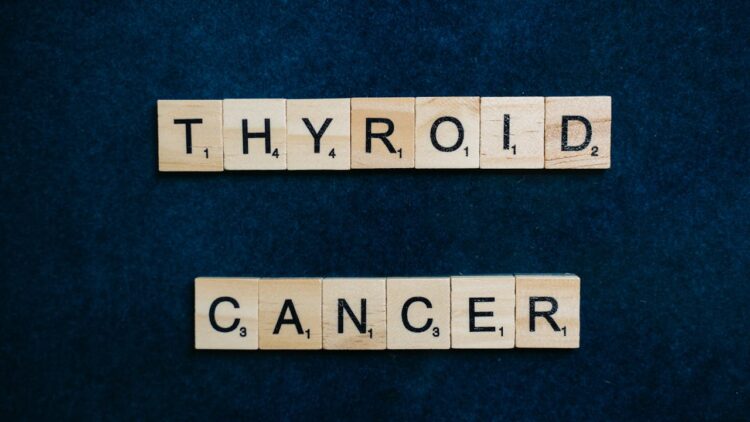The thyroid is a small, butterfly-shaped gland just below the Adam’s apple in the front of the neck. Two common types of thyroidism are Hyperthyroidism and Hypothyroidism. The thyroid is essential in controlling the body’s metabolism, which is how it uses energy. The thyroid produces hormones, fundamentally thyroxine (T4) and triiodothyronine (T3), which impact many capabilities, for example, pulse, internal heat level, and how rapidly food is changed over into energy.
Types Of Thyroid

Read also: Top 5 Yoga Asanas for a Healthy Liver
This organ is critical for health since it influences different body systems. In certain types of Thyroid, if the thyroid creates a lot of hormones (a condition called hyperthyroidism), it can prompt side effects like weight loss, fast heartbeat, and anxiety. Alternately, on the off chance that it delivers too little hormone (hypothyroidism), it can cause weight gain, tiredness, and depression. The thyroid can likewise protect against different issues, like goiter (an extension of the organ), thyroid knobs (knots that can be harmless or dangerous), and thyroid disease.
Hyperthyroidism
Hyperthyroidism is an issue where the thyroid gland in the neck creates an excess of thyroid hormone. Your metabolism, or the rate at which your body uses energy, is governed by this hormone. At the point when there is a lot of thyroid hormone, your body works quicker than usual. Many things can cause hyperthyroidism. The most well-known cause is Graves’ illness, an immune system problem where the body’s safe system goes after the thyroid organ, making it overactive. Different causes include thyroid knobs, which are little lumps in the thyroid that produce a lot of hormone, and thyroiditis, which is irritation of the thyroid organ.
Symptoms of hyperthyroidism
Weight reduction: One of the most perceptible symptoms of hyperthyroidism is losing weight. Regardless of whether you are eating something very similar or more than expected, you might, in any case, get weight loss the fact that your body is consuming energy quicker than usual.
Fatigue and muscle weakness: Even though you might be active and restless, your muscles might feel weak, and you might run out of energy quickly. Regular exercises can become exhausting.

Changes in Menstrual: common symptoms of hyperthyroidism; women with hyperthyroidism could see that their periods become lighter, less continuous, or even stop out and out.
Skin Changes: Skin that is thin and fragile your skin may become thinner and more fragile, prone to tearing or bruising. You could see your hair falling or dropping out more than expected.
Mood Changes: Mood swings can cause you to feel your mood changing quickly from happy to miserable or quiet to irritated. Trouble concentrating can make it challenging to zero in on undertakings or recall things.
Eye problems: In Graves’ sickness, common symptoms of hyperthyroidism include eye issues and protruding eyes (exophthalmos), and your eyes might seem like they are swelling out more than expected. Eye Bothering can feel dry, gritty, or disturbed.
Treatment of hyperthyroidism
Radioactive Therapy:
This treatment includes taking a radioactive iodine capsule or fluid. The thyroid gland takes in the iodine and slowly destroys overactive thyroid cells as it absorbs it, reducing the gland’s capacity to produce thyroid hormones. The radioactive iodine targets and annihilates the thyroid organ’s cells precisely without influencing different tissues in the body.

Surgery:
Surgery to eliminate part of the thyroid organ can be a powerful therapy for hyperthyroidism in situations where other therapies are not appropriate or have failed. It works by partial thyroidectomy, where just part of the thyroid organ is eliminated, which can decrease hormone creation while possibly protecting some thyroid capability. The entire thyroid gland is removed during a total thyroidectomy, which eliminates hormone production.
Hypothyroidism
Hypothyroidism is when the thyroid organ, situated toward the front of the neck, creates too minimal thyroid hormone. These hormones are fundamental for directing the body’s digestion, which influences how the body utilizes energy. When the thyroid hormone levels are low, many of the body’s capabilities are delayed. Typical reasons for hypothyroidism include immune system illnesses like Hashimoto’s thyroiditis, where the resistant system goes after the thyroid organ, decreasing its capacity to deliver hormones. Treatment of hypothyroidism can be iodine deficiency, certain medications, radiation treatment, and thyroid medical procedures.
Symptoms of Hypothyroidism
- Weight Gain: Unexplained weight gain or trouble losing weight regardless of not eating more than expected is typical.
- Dry Skin and Hair: Dry, rough, and itchy skin and dry, brittle, and prone to breakage and hair loss can occur.
- Mood Swings and Depression: Hypothyroidism can affect mood and cause depression, irritability, and mood swings.

- Cholesterol Levels: Raised cholesterol levels, especially LDL (awful) cholesterol, can increase the risk of heart disease.
- Irregular Menstrual Periods: Women with hypothyroidism may experience amenorrhea, which is the absence of periods or menstrual periods that are heavy, prolonged, or irregular.
- Joint Pain and Stiffness: Hypothyroidism can cause joint pain, stiffness, and swelling, particularly in the hands and feet.
Treatment of Hypothyroidism
Thyroid Hormone Replacement Therapy: One treatment for hypothyroidism is Levothyroxine, and other synthetic thyroid hormone medications are the primary treatment. This prescription replaces the lack of thyroid hormone in the body and re-establishes thyroid capability to regular levels.
Supplementation: Supplementation is one of the standard treatments for hypothyroidism, and nutrients and minerals might be valuable for people with hypothyroidism. This might include selenium, zinc, vitamin D, and vitamin B12, which support thyroid function and general well-being.
Avoidance of Goitrogenic Foods: Treatment of hypothyroidism might benefit from avoiding or restricting specific food varieties known as goitrogens, which can obstruct thyroid function. These include cruciferous vegetables like broccoli, cabbage, Brussels sprouts, and soy-based items.
Monitoring and Adjustment: Patients undergoing thyroid hormone substitution treatment require regular observation of thyroid capability through blood tests. This allows medical services suppliers to change the measurement of thyroid hormone drugs on a case-by-case basis to keep up with ideal hormone levels in the body.

The thyroid gland is necessary for maintaining the body’s metabolic balance and overall health. Types Of Thyroid like hypothyroidism (underactive thyroid) and hyperthyroidism (overactive thyroid) can essentially affect daily life and health. Proper diagnosis, treatment, and monitoring are essential to manage thyroid conditions and ensure optimal health effectively.
To get more of our exclusive content on Health Care and Lifestyle. Follow us on YouTube and Instagram.






